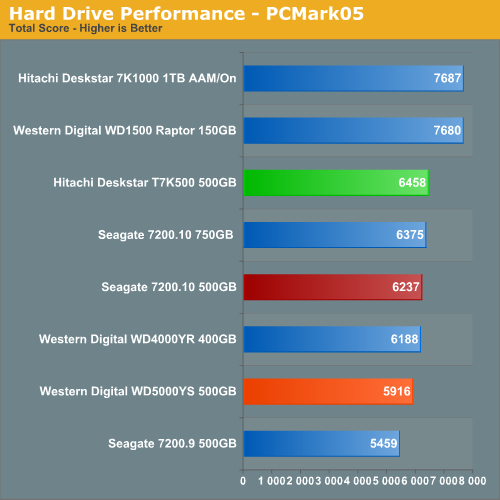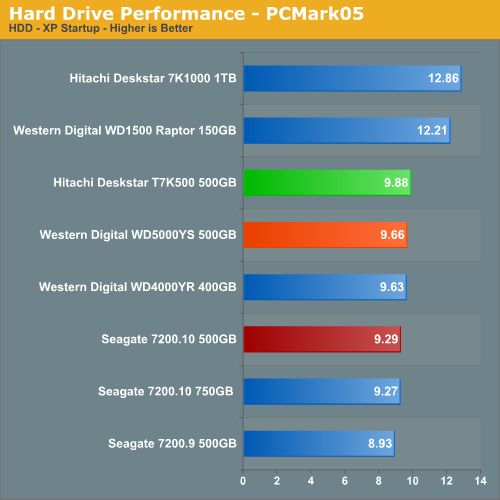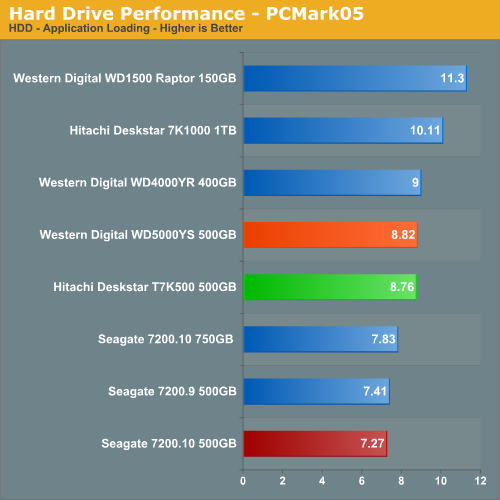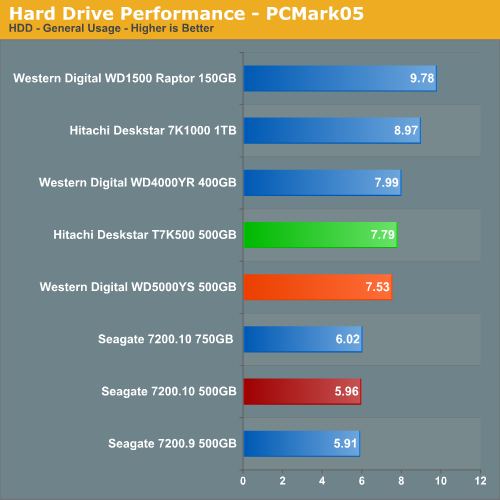Seagate 7200.10 500GB: Hitting the Sweet Spot
by Gary Key and Dave Robinet on July 6, 2007 11:00 PM EST- Posted in
- Storage
PCMark05 Performance
We are utilizing the HDD test suite within PCMark05 for further comparative hard disk scores as it provides a mixture of actual application results and specific read/write percentages utilized within these programs. It is also a readily available benchmark that others can use for comparative purposes. The program utilizes the RankDisk application within the Intel iPEAK SPT suite of tools to record a trace of disk activity during usage of real world applications. These traces are then replayed to generate performance measurements based upon the actual disk operations within each application. The HDD test suite contains 53% read and 47% write operations with each trace section utilizing varied amounts of read or write operations. Additional information about the test suite can be found in PDF format here PCMark05 whitepaper.
The PCMark05 test results are based upon the following trace runs:
Windows XP Startup: This test consists of 90% reading and 10% writes that tracks XP activities at start-up.
Application Loading: This test consists of 83% reading and 17% writes that tracks the opening and closing of the following programs.




Our PCMark05 numbers surprised us with the Seagate 7200.10 500GB drive falling about 3% behind the Hitachi 500GB drive in the overall score. Based upon the performance of the Seagate 750GB drive we actually expected it to be worse. Although not shown, the Seagate drive scored about 27% better in the antivirus test and around 9% in the write tests which helped to buoy its final score. However, in the important application and general hard disk tests we see the Hitachi drive scoring up to 29% better and we will see this pattern continue in our iPEAK tests.
We are utilizing the HDD test suite within PCMark05 for further comparative hard disk scores as it provides a mixture of actual application results and specific read/write percentages utilized within these programs. It is also a readily available benchmark that others can use for comparative purposes. The program utilizes the RankDisk application within the Intel iPEAK SPT suite of tools to record a trace of disk activity during usage of real world applications. These traces are then replayed to generate performance measurements based upon the actual disk operations within each application. The HDD test suite contains 53% read and 47% write operations with each trace section utilizing varied amounts of read or write operations. Additional information about the test suite can be found in PDF format here PCMark05 whitepaper.
The PCMark05 test results are based upon the following trace runs:
Windows XP Startup: This test consists of 90% reading and 10% writes that tracks XP activities at start-up.
Application Loading: This test consists of 83% reading and 17% writes that tracks the opening and closing of the following programs.
- Microsoft Word
- Adobe Acrobat Reader
- Windows Media Player
- 3Dmark 2001SE
- Leadtek WinFast DVD
- Mozilla Internet Browser
- Opening a Microsoft Word document, performing grammar check, saving and closing
- Compression and decompression using WinZip
- Encrypting and decrypting a file using PowerCrypt
- Scanning files for viruses using F-Secure Antivirus
- Playing an MP3 file with Winamp
- Playing a WAV file with Winamp
- Playing a DivX video using the DivX codec and Windows Media Player
- Playing a WMV video file using Windows Media Player
- Viewing pictures using Windows Picture Viewer
- Browsing the Internet using Microsoft Internet Explorer
- Loading, playing and exiting a game with Tom Clancy's Ghost Recon




Our PCMark05 numbers surprised us with the Seagate 7200.10 500GB drive falling about 3% behind the Hitachi 500GB drive in the overall score. Based upon the performance of the Seagate 750GB drive we actually expected it to be worse. Although not shown, the Seagate drive scored about 27% better in the antivirus test and around 9% in the write tests which helped to buoy its final score. However, in the important application and general hard disk tests we see the Hitachi drive scoring up to 29% better and we will see this pattern continue in our iPEAK tests.










19 Comments
View All Comments
TA152H - Sunday, July 8, 2007 - link
That's absurd, for a hard drive company to make consistently lousy drives would kill it. There is reputation, and reputation matters a hell of lot. Are you too young to remember the nickname "Crashtor" for Maxtor drives? They shrunk big time when their drives sucked. So, no, they can't afford to make sucky drives that break all the time, but even within the context of a warranty, why do you suppose Western Digital and Hitachi don't do it if it's so inexpensive? Hmmmmm, maybe because they can't?Seagate has never had the notoriety for failures that IBM or Western Digital has. IBM's were of course more publicized, but even Western Digital's were fairly well known. Since people who are buying drives for servers and such are generally much smarter than the average person, and have good memories (scars?) when hardware fails, there is still some residual antipathy for IBM/Hitachi hard disks, and Western Digital. I haven't heard anything bad about Samsung, but I bought three of them and they all sucked. One was DOA, the other stopped working after a year, and the other had such an annoying whine to it, I eventually pulled it and used it as a projectile against encroaching squirrels. If other people have these experiences with Samsung, and people do tell other people they know, they may also have a less than stellar reputation, despite not being as publicized as IBM or Western Digital. Seagate, despite being the best known hard disk maker since the creation of the IBM PC XT, has managed to gain an excellent reputation for their drives. My only fear is that since they bought "Crashtor", it might take a few years to get back on track after absorbing that miserable company, so I've been avoiding them for a while. To this date, I have never had a Seagate hard drive fail, despite using them almost exclusively.
Anyone know what happened to Quantum? Boy did they suck. They whined worse than a kid at a carnival that didn't have enough money to buy cotton candy. What awful drives. Probably another company ate them.
ielmox - Tuesday, July 24, 2007 - link
Late 2001 - commissioned a system with the blisteringly fast IBM Deskstar. These drives smoked the competition and I was impressed with IBM engineering. Six months later, my system exploded and I became acquainted with the nickname "Deathstar".2002 - the contractor replaced the Deathstars with Crashtors. Failure less than 2 months later.
2002 - exasperated contractor installed Seagates, telling me that if these failed as well then my body must be emitting some sort of destructive magnetic field. The Seagates are still going strong today, and my PC is on for weeks at a time and under constant BitTorrent activity.
I like the performance indicated by recent AT and other articles for Samsung and Hitachi drives, but I respect the Seagate brand for its reliability and warranty. I'm really looking forward to seeing reviews of the Barracuda 7200.11, assuming of course that it ever makes the leap from press release concept to actual market product.
JakeBlade - Saturday, July 7, 2007 - link
Conveniently didn't include the latest 750GB Western Digital SE which blows away even the 1TB Hitachi.Also, I disagree with the weak brown nose attempt at the end by saying this turd 7200.10 drive "would still be a very solid choice for a gaming machine." Ummm, any gaming machine I build would have the 160GB WD or the Raptor. Then if you want mass storage for multimedia or binaries you get a Samsung T166 which is dead silent, has huge transfer rates, and is low priced.
DerekWilson - Saturday, July 7, 2007 - link
You really have to keep in mind that in a well designed game running on a system with a good amount of RAM, HD speed really won't impact gameplay. Yeah, install patching and load times will be affected, but generally gameplay is not a factor.We've seen it in real world benchmarks time and time again. If a game developer wants to make a playable game, there's just no way they can allow disk speed to become a performance factor.
The recent exception to this is S.T.A.L.K.E.R., which can hit the disk pretty hard when caching large areas of the map. Honestly, this was a poor design decision on the part of the developer. But you can actually adjust the behavior of the game here and get better performance with less caching. Tweakguides.com has a good description of how to do this.
Either way, a gamer is almost always better off putting more money into cpu, ram, or gpu.
TA152H - Saturday, July 7, 2007 - link
Good, thorough, review, but I have a couple of questions.Maybe the purpose of this question might make more sense if I first say I only buy Seagate hard disks, having had reliability problems with both Western Digital and IBM (Hitachi) and have been extremely happy with Seagate reliability (maybe it's no coincidence they offer longer warranties). Consequently, I don't care how these drives compare with them (although, certainly others will, so I'm not at all saying they shouldn't have been compared with them), but more curious about how it compared with the 7200.9.
The results were extremely impressive vis-a-vis the 7200.9, which concerns me because they seem too good. The problem is, it isn't too clear what exactly you picked for the 7200.9 . Did this also have a 16 mb cache? I suspect it was probably a little smaller and that might explain the huge (relatively) performance improvement of the 7200.9. It also might have been interesting to list the cache sizes of the competing drives, although it is probably possible for someone to look them up (again, since I wouldn't even consider them, I haven't bothered, but someone that would might be interested). 16 mb is kind of large, and might explain some of the "personality" of the hard disk, and why sometimes the lower raw performance is masked in certain benchmarks. I'm guessing, of course.
One other question that you might not know how to test for (I don't). If you have a hard disk that is sleeping and you request data for it that is on cache, does it spin up or is it smart enough to know this is unnecessary?
nrb - Saturday, July 7, 2007 - link
That Hitachi 7K1000 comes out of the benchmark rather well. Those accoustic scores are astonishing.Nossy - Saturday, July 7, 2007 - link
I guess I will wait for the new Seagate 7200.11 drives. This was a good review, but I don't understand why it's done now, right before a new generation of drives comes out?Regs - Friday, July 6, 2007 - link
Though it didn't come with any mount screws so I didin't install it yet.In the real world the guess the performance outside of a server would'nt be noticed. Fair assumption?
CrystalBay - Friday, July 6, 2007 - link
Cmon Regs, no mount screws ?